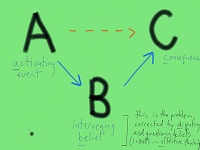
Marlene Busko
Medscape Medical News 2008. © 2008 Medscape
January 23, 2008 — In a small study of 10 patients with obsessive-compulsive disorder (OCD), just 4 weeks of intensive cognitive behavioral therapy resulted in significant changes in activity in certain regions of the brain.
In addition to having significant declines in bilateral thalamic activity, the patients had significant increases in right dorsal anterior cingulate cortex activity that correlated with improvement in OCD symptoms.
“This study is exciting because it tells us more about how cognitive behavioral therapy works for OCD and shows that both robust clinical improvements and changes in brain activity occur after only 4 weeks of intensive treatment,” said lead author Sanjaya Saxena, MD, from the University of California, San Diego School of Medicine, in a press release issued by the university.
The study is published online January 8, 2008 in Molecular Psychiatry.
Clinical response to OCD symptoms usually requires up to 12 weeks of treatment with serotonin-reuptake inhibitors (SRIs) or standard weekly outpatient cognitive behavioral therapy, the group writes, adding that little is known about the brain’s response to cognitive behavioral therapy in OCD.
Brief, intensive, daily cognitive behavioral therapy (specifically, exposure and response-prevention therapy) has been shown to be effective in 60% to 80% of OCD patients in as little as 4 weeks, with a symptom improvement of 50% to 80%, the group notes.
They sought to elucidate how the brain is affected by brief, intensive cognitive behavioral therapy in OCD.
Ten adult patients with OCD (6 men, 4 women; mean age, 40.6 years) and 12 normal controls (4 men, 8 women; mean age, 46.4 years) completed the study. Two of 12 OCD patients who were initially enrolled dropped out. Six of the 10 OCD patients were taking medications (SRIs and, in some cases, adjunctive medications), which were not changed during the study.
All OCD patients received 90 minutes of individual exposure and response-prevention therapy sessions with the same expert therapist, 5 days a week, for 4 weeks.
Cerebral glucose metabolism — a measure of brain-cell activity — was determined using 18F-fluorodeoxyglucose positron emission tomography. The 10 OCD patients had brain scans before and after 4 weeks of intensive treatment, and the 12 normal controls had 2 brain scans several weeks apart.
Two Novel Findings
After 4 weeks of treatment, the patients showed robust improvements in OCD symptoms, depression, anxiety, and overall functioning, and they had significant changes in regional cerebral glucose metabolism. Nine of the 10 patients met criteria for treatment response.
“There were 2 novel findings in this study,” the group writes. First, the OCD patients had significant changes in brain activity after just 4 weeks of intensive cognitive behavioral therapy, “much faster than previously seen with SRI treatment or standard weekly cognitive behavioral therapy.” Second, this brief intervention resulted in “a unique pattern of changes in normalized regional glucose metabolism.”
A reduction in thalamic activity may be a final common pathway for improvement of OCD symptoms in response to a variety of treatment modalities, the team writes. Response to intensive cognitive behavioral therapy may require activation of the dorsal anterior cingulate cortex, a region involved in the reappraisal and suppression of negative emotions, they suggest.
“Remarkable and Rapid Benefits”
“Our results highlight the remarkable and rapid benefits of intensive daily cognitive-behavioral therapy [CBT] for OCD, even for patients who had not responded well to standard treatment previously,” Dr. Saxena said in a comment to Medscape Psychiatry. Intensive CBT should be the treatment of choice for patients whose OCD has been refractory to standard treatments, he added. “Our findings should encourage more clinicians to provide intensive CBT, which is not widely available at present. Our results should also spur health insurance companies and other third-party payers to cover intensive CBT, because it can be highly effective in such a short time and it clearly has neurobiological effects.”
The study was supported by a National Institute of Mental Health grant. No financial conflicts of interest were reported.
Mol Psychiatry. Published online January 8, 2008. Abstract








التعليقات